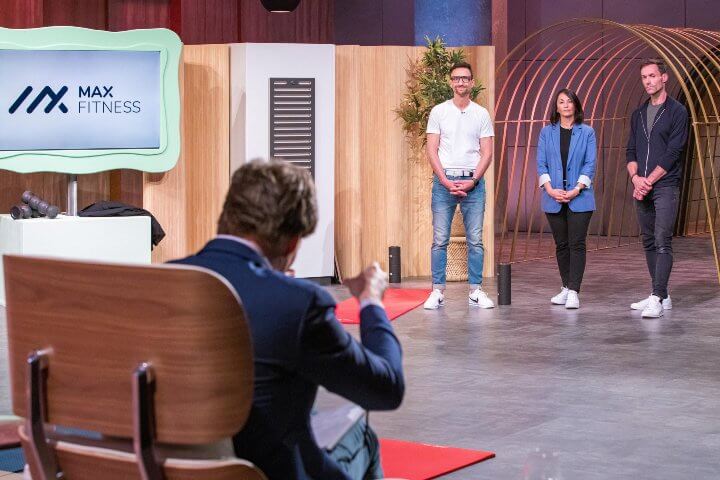Max-Fitness: Why are loans negative for investors? #DHDL
The founding team of Max Fitness impressed on Monday's episode of ‘Die Höhle der Löwen’ with brand ambassador Sven Hannawald, a great product and good initial figures. It almost came to a lion battle, but then they mentioned a large loan and at least one lion jumped off again. But why exactly does something like this seem to be a deal-breaker for investors?
Sunday,
04.05.2025

Sometimes investor negotiations are like thrillers: things can look good for a long time, but just before the handshake that seals the deal, an issue suddenly arises that changes everything. In the case of the start-up ‘Max Fitness’, it was a loan that the lions didn’t seem to like at all.
But why is that, given that start-ups have to finance themselves somehow? And why can it be such a deal-breaker when everything else is convincing?
Because the founding team of Max Fitness actually got off to a very good start: ski jumping legend Sven Hannawald opened the pitch, the products for easier handling of the much-vaunted fascia rollers were convincing without exception and the deal of €240,000 for 20% was also quickly seen as less objectionable.
Even if the sales figures are not impressive from the start in 2022, the start-up achieved an annual turnover of around €260,000 last year, for which the proposed valuation of €1.2 million was not considered exorbitant.
Although viewers are not told exactly how the lions determine this, one could assume, for example, that they calculate a multiple on the turnover, as is so often the case, and here it is around 4.6, which is within a normal range in this area.
However, the multiple is by no means the only factor that influences the valuation; many factors play a role here, albeit with very different weightings depending on the sector and phase of the start-up.
However, the founding team can certainly score points in most of them: the margin seems good at 25% production costs, and the answers in the area of sales planning or sales strategy also seem to satisfy the lions.
But then – or so it seems in the final cut – the founder mentions something that provokes a completely different reaction from the lions than expected: namely that around €800,000 in loans have been invested in the company so far, for example in tool costs (usually meaning the expensive injection moulds that are needed to start production in the first place), but also in pre-orders for packaging that is now in stock.
The founder probably wanted to emphasise that they have already laid the foundations and are now ready for large-scale marketing.
But this plan doesn’t seem to be working out at all: Lion Nils Glagau backs out, although he admits that he had actually wanted to make a deal offer.
But now the risk as an investor is too high for him and he emphasises that this existing loan changes the whole deal.
Ralf Dümmel then interjects that the valuation is too high, but is still convinced by the product, although he is clearly struggling with the loan and the high price.
But why is such a loan a killer argument? Why does it change the whole deal and should the founder have kept it quiet? The answer to the first question is relatively simple: because it means a significant outflow of money.
After all, a loan of this amount – even in the case of promotional loans, which often grant start-ups a generous instalment break at the beginning – often means monthly instalments in the 4-digit range. This means that the investor’s money will probably also have to be used for this.
However, an investor would much rather see his money used for pure growth or to build up the necessary company infrastructure.
A simple example: instead of such an instalment payment, if the loan did not exist, you could, for example, create a position in the social media sector to ensure reach and online sales. A startup like this naturally grows much faster than one that has to spend money on instalments to a bank.
Accordingly, an investor must expect that growth will be slower and therefore larger sales will take longer to materialise, meaning that less money is available for growth, etc.
If the €800,000 had come from an earlier investor, the founding team would have had to give up shares, which – had there not been too many of them – would probably have been less disruptive to the growth of the start-up and therefore to potential follow-up investors such as the lions.
But anyone thinking ‘I wish they hadn’t said that!’ is completely wrong. Because then the deal would probably have fallen through during the due diligence phase at the latest, because this is where such things are guaranteed to come out. And with such tactics, you quickly come under suspicion of not being truly transparent, which is usually the death knell of any investor negotiation.
So Max Fitness did everything right with this revelation after all, because it allowed those for whom a loan really is a deal-breaker to back out, and Ralf Dümmel had the chance to correct the valuation accordingly in a small negotiation thriller: he asked the founding team to go to their pain threshold with the shares and, in fairness, wrote down the minimum percentage he wanted to do the deal at.
In the end, the two figures actually matched exactly and the founding team and new investor agreed to €240,000 for 30%.
Does honesty last the longest? There is little that can be said across the board in investor negotiations, but if there is, this is certainly one of them.
Photo (above): TVNOW / Bernd-Michael Maurer

Ruth Cremer
Ruth Cremer is a mathematician and consultant as well as a university lecturer in the field of business models, key figures and financial planning. As a former investment manager, she knows what investors look for and also helps with pitch and document preparation in the investment or acquisition process. Since 2017, she is involved as an external consultant in the selection and preparation of the candidates in "Die Höhle der Löwen".
